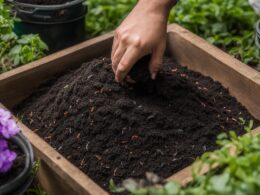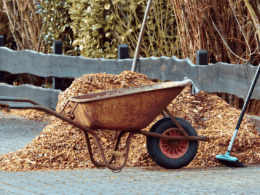Are you struggling to get your garden to grow? Do your plants look lackluster and sickly? It may be time to take a closer look at your soil’s pH level. Maintaining the right pH level is crucial for healthy plant growth, and can make all the difference in the success of your garden.
But don’t worry, boosting your garden’s pH level is easier than you think! In this article, we will explore the basics of soil pH and how to raise it for vibrant growth in your garden. You’ll learn simple tips and tricks to achieve the perfect pH level for your plants to thrive.
With a little effort and know-how, you’ll be on your way to a flourishing and beautiful garden in no time. So let’s get started!
Quick Takeaways
- The optimal soil pH level for healthy plant growth is between 6.2 and 6.8.
- Different pH-raising amendments such as lime, wood ash, and baking soda can be used, but it’s important to apply them evenly and not overdo it.
- Soil pH levels can affect nutrient availability and the growth and yield of crops, so regular monitoring is crucial.
- Incorporating organic matter can also help raise pH and improve soil structure.
Soil pH Basics
If you want healthy and vibrant plants, you need to understand soil pH basics. This includes knowing the optimal pH range for growth, how to test your soil, and the potential issues caused by low or high pH levels.
Testing techniques, such as using a pH meter or test kit, can help you determine the pH level of your soil. Maintaining the correct pH level is crucial for your plants’ health and growth.
Low pH can make it difficult for plants to grow, while high pH levels can cause different issues. Plants thrive in soil with a pH between 6.2 and 6.8.
Testing your soil is crucial to identify any potential pH issues. Regular pH maintenance, using amendments such as lime or wood ash, can help you achieve the optimal pH level for your plants. Keep in mind that different plants have different pH preferences, so it’s important to do your research and adjust accordingly.
How Can I Adjust the pH of the Soil in My Raised Garden Bed?
Tips for filling raised garden beds can greatly help in adjusting the pH of the soil. Firstly, test the pH level and determine if it needs adjustment. If the soil is too acidic, add lime to raise the pH. For alkaline soil, sulfur can be used to lower it. Remember to mix the amendment thoroughly to ensure an even pH throughout the bed.
Raising Soil pH
To raise the pH of your soil quickly and safely, use natural additives like lime, potassium carbonate, wood ash, baking soda, or eggshells. Apply them evenly and be cautious not to overdo it, as this can turn the soil alkaline. Incorporate the amendments to the required depth using a power tiller, spade, or rake and water the area afterward.
Check the pH regularly and repeat the application as necessary. When using lime or ash to raise the pH of your soil, be sure to protect yourself by wearing gloves, goggles, and a mask. Always follow the instructions on the product label.
It’s important to note that topdressing a product over the soil surface only adjusts pH two or three centimeters deep, and lab-tested soil results will indicate how much amendment material is required. By taking these pH raising safety precautions, you can ensure vibrant growth in your garden.
Importance of Soil pH
Understanding the importance of soil pH is crucial for successful gardening. Proper pH levels play a significant role in the growth and yield of your plants, as it affects nutrient availability and uptake. Different plants have different pH preferences, and the optimal pH range for most garden plants is between 6.2 and 6.8. Maintaining the correct pH level in your soil can lead to vibrant growth and colorful flowers, while improper pH levels can lead to nutrient deficiencies or toxic buildup of certain nutrients.
To help you understand the importance of soil pH, here is a table that shows the benefits of proper pH levels and the effects of pH on plant growth and yield.
| Benefits of Proper pH Levels | Effects of pH on Plant Growth and Yield |
|---|---|
| Improves nutrient availability | Affects nutrient uptake |
| Helps prevent nutrient deficiencies | Can lead to toxic build-up of certain nutrients |
| Enhances root development | Impacts plant growth and yield |
| Increases the efficiency of fertilizers | Affects the color, size, and quality of flowers and fruits |
| Promotes healthy microbial activity | Affects soil structure and water-holding capacity |
Remember to test your soil pH regularly and adjust it as necessary. By doing so, you can ensure that your plants have the best chance to thrive and produce a bountiful harvest.
Frequently Asked Questions
Can soil pH affect the flavor of fruits and vegetables grown in the garden?
Soil pH affects the flavor of fruits and vegetables. The impact of soil pH on crop quality: a review shows that pH and nutrient uptake in plants are correlated. Regularly monitoring pH levels can improve crop quality.
Is it possible to lower soil pH too much and harm plants?
Yes, it’s possible to harm plants by lowering soil pH too much. Prevent over acidification by using pH balance techniques like adding lime or wood ash evenly. Test regularly to ensure the pH is safe for your plants.
Can soil pH change over time without adding any amendments?
Soil pH can change over time due to factors like rainfall, plant growth, and microbial activity. Testing soil pH regularly with a kit or meter can help monitor these changes. It’s important to know the pH for optimal plant growth and nutrient availability.
How does soil pH affect the effectiveness of fertilizers?
"Your soil pH affects fertilizer efficiency and optimal pH for plant growth. Low pH can hinder nutrient absorption, while high pH can cause nutrient lockup. Regular testing and adjustments are necessary for healthy plants." ‘Additionally, certain plants thrive in specific pH ranges, so understanding and maintaining the appropriate pH range for your desired plants is crucial for their growth and overall health.’
Are there any natural methods to lower soil pH, besides using sulfur?
Want to lower your soil pH naturally? Organic alternatives like peat moss, compost, and coffee grounds can help. Acidic plants like blueberries also lower pH. Keep monitoring pH levels to ensure safety for your garden.
Conclusion
So there you have it, gardener! Now you know all about soil pH and how to boost it for vibrant growth in your garden.
Remember, soil pH is super important for your plants to get the nutrients they need to thrive. So, you should test your soil regularly and adjust the pH as needed.
If your soil is too acidic, you can raise the pH by adding lime or wood ash. On the other hand, if your soil is too alkaline, you can lower the pH by adding sulfur or acidic fertilizers.
Keep an eye on your plants and the pH levels in your soil, and you’ll be on your way to a healthy and thriving garden in no time!









